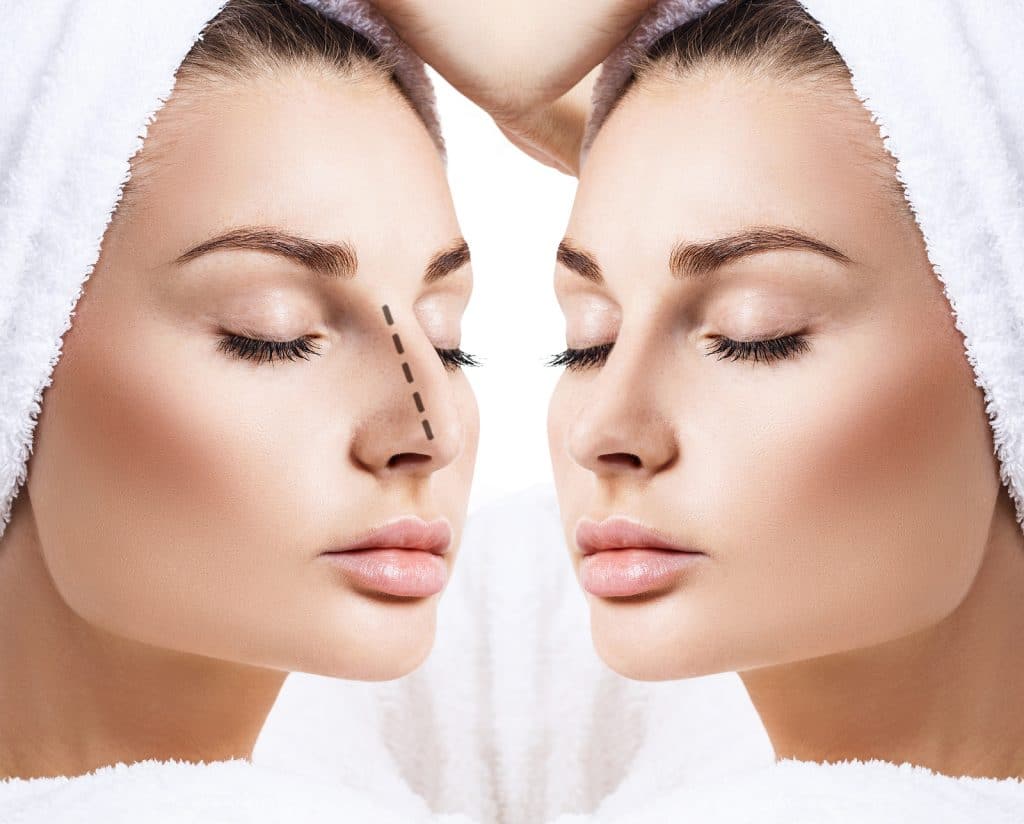Rhinoplasty surgery, commonly known as “nose job” is a surgical procedure carried out to improve the structure and function of the nose. During this procedure, the nasal cartilage and bones are modified, or tissue is added.
Rhinoplasty surgery may be performed for a number of reasons ranging from birth defects, trauma to cosmetics reasons.
Reasons for Rhinoplasty Surgery
The procedure is done for medical and aesthetic reasons.
Medical Reasons – Rhinoplasty surgery may be medically approved as the best course of action in different situations.
- Nasal injuries: Injury to the nose as a result of blunt, penetrating or blast trauma may require reconstructive surgery to resolve.
- Birth defects: Rhinoplasty may be required to treat some congenital nasal abnormalities such as cleft palate, nasal mass or weakness in the structure of the nose.
- Cancer: The most common reason for a nasal reconstruction is skin cancer, especially the lesions to the nose of melamona and basaal-cell carcinoa.
Rhinoplasty done for medical reasons such as these is often covered by health insurance.
Cosmetic Reasons
When rhinoplasty is done for aesthetic reasons, it is called cosmetic rhinoplasty. It is performed not as a result of a medical condition but to improve the appearance of the nose. These cosmetic changes are not covered by insurance.
Related: Chin Surgery
Surgical Procedure for Rhinoplasty
Rhinoplasty is performed under general anesthesia. A very small incision is made along the base of the nose, which is not noticeable after the skin heals. This incision is connected to incisions inside the nose, which are never seen. Those incisions permit access to the cartilage and bones of the nose. Next, the nasal passageways are improved and nasal reshaping (if desired) is performed through careful, meticulous adjustments to the bone and cartilage.
Most rhinoplasties leave the bones intact. If patients have had significant trauma to the nose in the past, the nasal bones are sometimes shifted into a more favorable position during surgery. For cosmetic reasons, a bony nasal hump may be smoothed down to a straight profile or gentler curve. Patients awaken from anesthesia and go home the same day.

rhinoplasty cosmetic surgery
Rhinoplasty Surgery Risks and Complications
Rhinoplasty is safe, however like all surgical procedures, complications can arise. They include:
- Bleeding: This is uncommon and often resolves on its own.
- Infection: The risk of an infection is minimal especially with prophylactic use of antibiotics. When infections occur, it might progress to become an abscess requiring the surgical drainage of the pus, while the patient is under general anesthesia.
- Polly beak deformity: This results when too much of the nasal cartilages have been removed. The external skin becomes shapeless, resembling the beak of a parrot.
- Septum Perforation: The surgeon might accidentally perforate the septum, which later can cause chronic nose bleeding, crusting of nasal fluids, difficult breathing, and whistling breathing.
Recovery
You should expect to take one week off from work or school. During that time rest, ice, and a regimen of nasal cleaning is recommended. While pain medications are provided, most people only require them for a few days.
During recovery, it is difficult to easily breathe through the nose because splints (bendable, thin plastic sheets) are placed inside the nose to keep the septum straight. Swelling peaks on the third day, and then decreases. Bruising under the eyes can sometimes occur. During the week after surgery, you’ll wear a small cast on your nose to protect it and reduce swelling.
One week after surgery the splints and cast are removed in the office. You may then return to work and resume cardio exercise, such as walking or running. You’ll need to avoid contact sports for six weeks. Otherwise, within two weeks after surgery, you should be back to your normal activities and routines.
While you are likely to heal quickly during the first month, full healing may take up to one year. The majority of swelling disappears in the first month, and all swelling should be gone within a year or less.
Rhinoplasty Surgery Cost
The total cost for rhinoplasty surgery depends on a lot of factors such as the anesthetic fee, private hospital fee, private operating facility fee, extent of surgery required. The total cost of the procedure is around $6500 – $7500.
More: Lipoma removal cost


